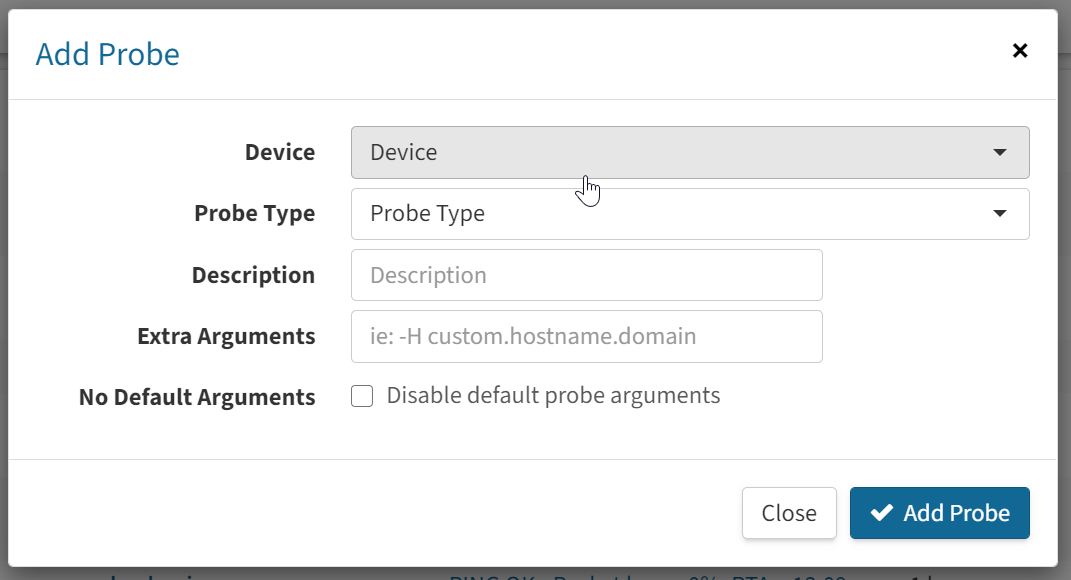Probes
Subscription Feature
This is a feature which is currently only included in the Subscription Edition of Observium.
Probes are the Observium term for standardised monitoring-plugins.org plugins.

To use the plugins in the probes system, you need to install the relevant packages for your distribution. Plugins are normally installed into /usr/lib/nagios/plugins/.
Observium should automatically detect and allow adding of probes where the corresponding plugin has been installed.
On Debian and Ubuntu install the following packages:
sudo apt install monitoring-plugins-basic monitoring-plugins-common monitoring-plugins-standard
On RedHat, CentOS and Fedora install the following packages. EPEL repository (not required on Fedora):
yum install epel-release
yum install --skip-broken nagios-plugins-all
Packages for other distributions may vary, or they can be installed from source available at monitoring-plugins.org.
Probes are added directly to a device using the Add Probe navbar item on the probes page, which is accessed from the Globe menu on the top navbar.

Probes will often include some basic defaults, such as automatically including "-H %hostname%" where applicable, or automatically including SNMP community strings. Default arguments can be disabled using the checkbox.
Probes on Unmonitored Devices
Overriding the hostname allows you to perform probe-based checks on devices which otherwise don't exist in Observium. We recommend adding these checks to Observium server's own device entry.
Arguments for individual probes can be found in the monitoring-plugins.org documentation, or directly from the commandline:
root@dev:~# /usr/lib/nagios/plugins/check_pop -h
check_pop v2.2 (monitoring-plugins 2.2)
Copyright (c) 1999 Ethan Galstad <nagios@nagios.org>
Copyright (c) 1999-2008 Monitoring Plugins Development Team
<devel@monitoring-plugins.org>
This plugin tests POP connections with the specified host (or unix socket).
Usage:
check_pop -H host -p port [-w <warning time>] [-c <critical time>] [-s <send string>]
[-e <expect string>] [-q <quit string>][-m <maximum bytes>] [-d <delay>]
[-t <timeout seconds>] [-r <refuse state>] [-M <mismatch state>] [-v] [-4|-6] [-j]
[-D <warn days cert expire>[,<crit days cert expire>]] [-S <use SSL>] [-E]
Options:
-S, --ssl
Use SSL for the connection.
-w, --warning=DOUBLE
Response time to result in warning status (seconds)
-c, --critical=DOUBLE
Response time to result in critical status (seconds)
...
Many available probe plugins allow very flexible tests to be performed, the table below lists plugins that Observium supports by default..
Defaults:
host - Passes the device's hostname via -H %hostname% or however the plugin supports
SNMP - Sets community string or SNMPv3 authentication information and timeouts/retries if supported by the plugin
| Probe | Description | Defaults |
|---|---|---|
check_snmp_cisco_wlc |
Check operability of Cisco APs on a controller. | host SNMP |
check_snmp_win |
Check Windows services via SNMP | host SNMP |
check_tcp |
Tests TCP connections with the specified host (or unix socket) | host |
check_udp |
Tests UDP connections with the specified host (or unix socket) | host |
check_http |
Tests the HTTP service on the specified host. It can test normal (http) and secure (https) servers, follow redirects, search for strings and regular expressions, check connection times, and report on certificate expiration times. | host |
check_clamd |
Tests clamd connections | host |
check_ftp |
Tests FTP connections | host |
check_haproxy |
Tests HAProxy health by parsing the stats page | host |
check_imap |
Tests IMAP connections | host |
check_jabber |
Tests Jabber connections | host |
check_ldap |
Tests LDAP/LDAPS connections | host |
check_nntp |
Tests NNTP connections | host |
check_nntps |
Tests NNTP connections | host |
check_ping |
Use ping to check latency and packetloss. | host -w 15,2% -c 20,5% |
check_pop |
Tests POP3 connections | host |
check_simap |
Tests SIMAP connections | host |
check_spop |
Tests SPOP connections | host |
check_ssmtp |
Tests SSMTP connections | host |
check_ssh |
Tests SSH connections | host |
check_smtp |
Tests SMTP connections | host |
check_mysql |
Tests connections to a MySQL server | host |
check_mysql_health |
Tests various parameters for MySQL health | host |
check_mysql_query |
Tests a MySQL query. A query is required. The result from the query should be numeric. For extra security, create a user with minimal access. | host |
check_ssl_cert |
Checks an X.509 certificate * checks if the server is running and delivers a valid certificate * checks if the CA matches a given pattern * checks the validity Source & Usage | host |